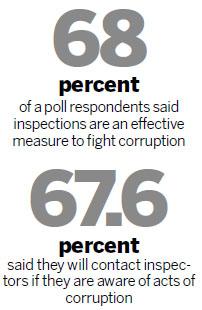
Nearly 96 percent of respondents to a survey supported the central government's decision to send inspectors across the country to uncover acts of corruption.
Roughly 211,272 netizens participated in the survey initiated last week by China Youth Daily and Tencent.com, the operator of WeChat, a popular instant messaging and voicemail service in China.
A majority of netizens said they expected the inspection work to be enhanced by the Central Commission for Discipline Inspection of the Communist Party of China, the country's top anti-graft watchdog.
The survey found that netizens were highly concerned by the local authorities' passiveness in punishing corrupt officials, the lack of transparency in State-owned enterprises and corruption in land development and government-funded projects.

Sixty-eight percent of respondents said inspections are an effective measure to fight corruption, and 67.6 percent said they will contact inspectors if they are aware of acts of corruption.
The survey's results come shortly after the beginning of this year's second round of inspections - which began on July 16. Wang Qishan, China's top anti-graft official, has instructed inspectors to keep a close eye on mineral resources, land seizures, real estate developments and government projects.
According to the Central Commission for Discipline Inspection, inspectors will go to 10 provinces, a central administration, a public institute and a State-owned enterprise to collect tip-offs on corrupt activities by senior officials. The commission has completed three rounds of inspection since early last year, with 21 out of the mainland's 31 provinces inspected.
The anti-corruption measure has proven effective. Among the 20 senior provincial-level and national-level officials investigated this year, 16 came from regions that were recently inspected.
In Shanxi province, where inspectors were dispatched late last year, four senior provincial-level officials have been investigated.
On Sunday, Wu Changshun, chief of Tianjin's public security bureau, was placed under investigation 12 days after the completion of an inspection.
The inspectors have also found new trends in corruption.
Inspection teams in Beijing and Tianjin said earlier this month that many lower level officials, including village leaders, were found to have committed serious acts of corruption.
Zhou Shuzhen, a professor of anti-graft studies at Renmin University of China, said more senior officials are likely to be probed in the second half of this year because of the large amount of tip-offs received by inspectors.
Zhuang Deshui, a professor of clean-governance research at Peking University, said the Central Commission for Discipline Inspection has improved its inspection work, such as dispatching special inspectors to several key industries. They are also investigating State-owned enterprises that are monopolizing industries.
Copyright ©1999-2018
Chinanews.com. All rights reserved.
Reproduction in whole or in part without permission is prohibited.